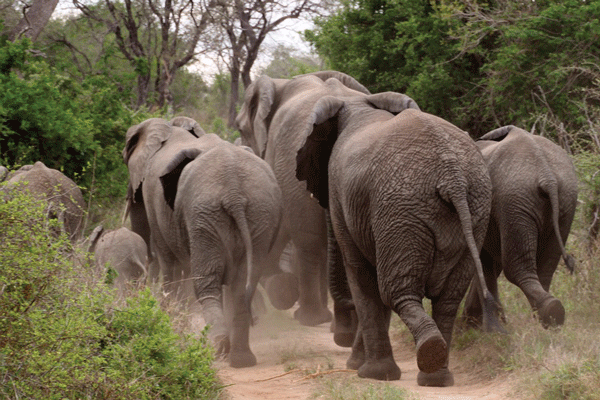
By Linda Mujuru
ONE late April evening, Christina Mudzongachiso and her husband were about to head home after a day in their cotton fields in Mbire, a rural community in northern Zimbabwe. That’s when a lone elephant thundered towards them.
With her 18-month-old baby strapped to her back, Mudzongachiso and her husband, Nero Muunganirwa, scampered away, and in an effort to save his wife and child, Muunganirwa pushed them out of the elephant’s path. But as he did, the animal trampled on him.
He died instantly.
Elephants have killed more than 100 people in Zimbabwe in recent years, as the country faces a crisis that would have been unheard of decades ago: After its elephant population plunged to fewer than 5 000 in the early 1900s, Zimbabwe is now witnessing conflict between humans and wildlife caused by the presence of too many of the giant herbivores.
The problem has revived debate over the role of so-called trophy hunters, an elite group of tourists who slay hundreds of elephants a year. Government officials say the hunters both help cull the elephants and provide much-needed revenue for a pandemic-ravaged tourism sector. But activists argue that the hunters do more harm than good.
“We believe that animals do not need to pay with their lives to ensure that their species are protected,” says Farai Maguwu, director of the Centre for Natural Resource Governance, a Zimbabwe-based advocacy and research organisation.
Trophy hunters typically kill about 200 elephants a year. For the privilege of roaming Zimbabwe’s parks for elephants, lions and other wildlife between May and November, they pay tens of thousands of dollars.
- Chamisa under fire over US$120K donation
- Mavhunga puts DeMbare into Chibuku quarterfinals
- Pension funds bet on Cabora Bassa oilfields
- Councils defy govt fire tender directive
Keep Reading
They have come in for criticism before. In 2015, an American dentist on a trophy-hunting trip in Zimbabwe attracted global scorn when he used a bow and arrow to kill a 12-year-old lion named Cecil.
At the time, the elephant population had rebounded to about 83 000. Ideally, Zimbabwe can host up to 50 000 elephants, says Tinashe Farawo, spokesperson for the government’s Zimbabwe Parks and Wildlife Management Authority.
Today, there are more than 100 000. The growth has outstripped the parks’ capacity to meet the elephants’ needs, Farawo says. And the coronavirus outbreak only made the situation worse.
Yet trophy hunters don’t kill enough animals to dent Zimbabwe’s elephant population, says Rob Lurie, chairperson of the Zimbabwe Professional Guides Association.
“We believe that animals do not need to pay with their lives to ensure that their species are protected.”
Among the hunters are people like Tom from Michigan, a State in the Midwestern United States, who asked not to be fully identified for fear of being stigmatised. His last hunting foray cost the retired contractor $30 000.
On that trip in 2018, he killed a bull elephant.
“We found the bull elephant feeding on some brush in the late afternoon,” he says. “Having seen he was a good-quality old bull with one broken tusk, I decided it was a worthy animal to harvest.”
Using a large-caliber rifle from about 9 metres away, he shot the elephant in the head.
“It was emotional, but I know it was necessary,” he says, suggesting that killing the elephant helped Zimbabwe’s conservation efforts. “And yes, I did enjoy the adrenaline of the hunt.”
Trophy hunters usually target older male and female elephants because of their ivory — a practice that “is extremely detrimental to the [elephant] population because both sexes provide critically important ecological and social knowledge, and they aid in the survival of the entire group,” says Audrey Delsink, wildlife director for Humane Society International/Africa, an animal protection group.
Trophy hunters are not to blame for conflicts between elephants and humans, Lurie says. Zimbabwe simply has too many elephants and not enough space for them. “Because their population habitat is being destroyed, [the elephants] end up moving to where people live in search of food.”
Elephants have killed over 120 people in just the last three years, peaking at 60 last year, says Farawo. And this year, they have already taken at least 30 lives.
One proposed solution: Add elephants to areas that don’t have as many, Farawo says. But that’s expensive.
Other revenue-generating options are more politically fraught. They include trophy hunting as well as selling both ivory — a practice outlawed in many countries — and the animals themselves.
“Tourism is not the panacea to wildlife,” Farawo says. “We need to have other options that we use to raise money.”
Trophy hunting helps fund animal conservation and aids rural Zimbabweans, says Emmanuel Fundira, president of the Safari Operators Association of Zimbabwe.
Tom, the trophy hunter, recalls that during his trip, “we took meat to the school and clinic and then the rest of the people. There was a lot of excitement and happiness with our delivery.
Some of these people had lost crops to the elephants, and this was some compensation at least.”
Trophy hunters go home after their trips, but “it is locals who bear the brunt of wildlife vengeance,” Maguwu says.
Mudzongachiso, 43, knows this all too well. She and Muunganirwa, who was 48 when he died, had been married for about three decades and had five children.
She recalls that he worked six days a week in their cotton fields, rarely quitting before sunset.
In their village, he was a headman — a traditional leader — who advised neighbours and helped resolve conflicts.
At home, Mudzongachiso says, he loved to play with his children.
“It pains me to think that he died so unexpectedly,” she says.
“I don’t know how l am going to carry on from where he left. Something should be done to avoid more people getting killed by these elephants.”
Linda Mujuru is a Global Press Journal reporter based in Harare. She specialises in reporting on agriculture and the economy.










